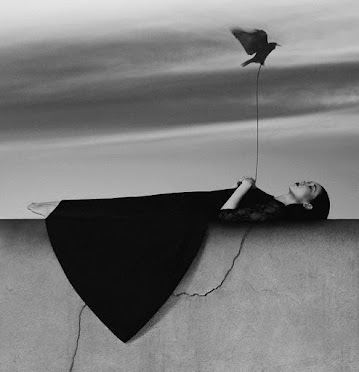VERLOREN
My
first memory of German
six
years old, running
through
our Łodź apartment
chanting Heil
Hitler
Hände hoch
petrified
parents
plucking
the exotic
bloodied
syllables
from
my happy mouth
but
when I was sixteen
my
neighbour from Silesia
called
me Fräulein Yoasia
she
taught me the caress of umlauts
long
journeys of Wehmut
leiden and verloren
that
music of sorrow
I
stood under those vowels
as
in a petal-fall
Ich bin verloren I whispered
in secret to myself
in the language of the enemy
described all around me
as “subhuman barking”
What verloren means
a Mazurian village
the blond bowing of the wheat
a
woman opens the door
on
the table she puts
milk
and honey
home-churned
butter
bread
fragrant with the sun
white lace blooms
in
the windows
saints
on the
lime-washed
wall
Memory is a translation
from
a dead language
she
waits for us forever
that
shimmering young girl
what verloren means
lost
mouths that kiss us
as
we pass
DAVID
He
meets me at the train station.
A
smile dances in his open face,
his
elegant lean body.
More
than I ever
loved
anyone, I love
my
son in my dream —
the
lost amber of his eyes,
marble
cross of shoulders.
How
do I know it would have
been
a son? A mother knows,
I
say, I who have no right
to
call myself a mother.
We
walk through a quiet town
dripping
with lilacs, peonies.
Is
it Pomerania where I was born,
its
cathedrals of clouds,
misty
Eden of the Yvelines,
river-rich
Hungary —
No,
these are the Mourning
Fields,
the green
country
of that other
memory,
rainy mirror
of
what didn’t happen.
How
lonely I’ve been.
We
step on a rain-beaded porch.
As
always, he disappears.
And
these words, this parched
paradise,
what
is
it if not
the
life he has given me.
EURYDICE IN PALM DESERT
Once
I was young and waiting
at
train stations, dissolving
in
a mist of promises, the halos
of last century’s lamps —
gray figures on the shore of the platform,
the rails beaded with metallic rain.
And
I loved that veil of waiting,
that
lesson in perspective —
peering
into the vanishing point.
Train
stations of Eros and roses,
hands
waving hello, goodbye,
whistles,
embraces breaking off —
and
underneath, the humid heart,
its
weather on the verge of
love
and tears.
Now
I stand rainless and trainless.
Memory,
mother of the Muses,
tell
me this is luck: I will not
be
swept away by a flood.
Unswept,
unwept,
exposed
on this plateau of light,
let
me borrow
for
a moment, for a breath,
the
bride’s bouquet of fog.
ASPHODEL
When
his darkness seized me,
the
great love of my youth,
when
I dared to reach for the most
magnificent
narcissus,
the
earth opened and horses
rearing
like black smoke
carried
me off to marry
the
Invisible Lord —
so
my song would be both
ravishing
and true.
Because
love has two flowers:
narcissus
and asphodel.
A
hundred-headed narcissus!
We
grow of many minds.
A
hundred wishes, ten thousand —
and
echo has the last word.
Narcissus
— flower of youth,
rippling
into departure.
Asphodel
swaying in no wind,
in
twilight memory of sun,
you
have no scent except
in
the mind that remembers.
Asphodel,
flower of soul,
of
love at the ripe hour:
the
ancients understood
the
soul feeds on flowers.
Even
in hell,
a
life filled with flowers.
After
trails of sunny narcissi,
I
walk in mothlike meadows.
HURRICANE RIDGE
The
glaciers tongue me, cliffs of ice,
pools
of polar green.
Across
eternal snow, a deer
steps
out on the trail.
His
antlers hold the flame-blue sky,
his
crown of shining branches.
He
stares at me without fear,
then
climbs straight up,
barely
nudges the slippery scree.
How
could I know it would be
neither
a lover nor a holy sage,
but
a deer in a tundra of clouds —
this
messenger making me feel
one
day I’ll walk forever —
if
thirsty, eating snow,
when
tired, leaning on the wind.
My
shadow lengthening past noon,
I
want one wish granted to me:
to
hike again along the crest
here
on Hurricane Ridge,
and
let a deer like that once more
step
out before me on the path,
look
at me calmly, and walk on.
I’ll
follow him.
Oriana Ivy was born and raised in Poland. She came to the United States when she was 17. Her poems, essays, book reviews, and translations have been published in Poetry, Ploughshares, Best American Poetry, Nimrod, Spoon River Review, The Iowa Review, Black Warrior Review, Los Angeles Review of Books and many others. She’s the prize winning author of the chapbooks April Snow (Finishing Line Press), From a New World (Paper Nautilus), and How to Jump from a Moving Train (forthcoming from Cervena Barva). A former journalist and community college instructor, she leads an online Poetry Salon. Her poetry-and-culture blog, oriana-poetry.blogspot.com, has gained an international audience. She lives in Southern California.


No comments:
Post a Comment